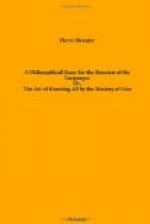The same is not altogether allowable in relation to the Consonants, where we must not admitt indifferently all sorts of changes; the sole affinity of the Organs is that which must regulate almost all their varieties: the Labiall letters easily supplant one another but the Dentall or Linguall with more difficulty succeed them as being not of the same order; For as these consonants, M. B. P. V. F. make neer the same sound, which is modified by the divers force of the Air opening the lips after severall forms. So the Letters D. T. Z. S. ought to make an order by themselves, having a particular relation to the point of the tongue, which only by touching upon the teeth in various manners frames their pronunciation.
But it is not a single and easie reflexion, that can absolutely determine whether two letters have resemblance and proportion, because there are some of them that being made up of the movements of severall organs, maybe differently alter’d according to their various resemblances, so the letter H. carrys not only the resemblance of a gutturall as it is pronounc’d by the assistance of the muscles of the throat, but also as an Aspiration besides the regard it hath to the whispers of the tongue, and the 6. Aspirates of the Lips, Teeth, and Palate. However if the precipitance or forwardnesse of any, hath by chance brought into use, other methods of altering sounds, as they have not so certain a foundation in reason, so neither can they be receiv’d within the Compas of this Art, at least being not establisht by a regular and constant analogie.
From the sound of words, I passe to their signification, which in the same dialect may be call’d the soul of a word, as the sound is its body; to expresse it in other terms, then what seem to rellish the dry and unpleasant humour of the Pedant or Grammarian; I suppose that words being the expressions of our thoughts, and our thoughts the representations of objects, the different significations that are given to words, principally depend upon the various conceptions, that every Nation frames of the same objects, agreeable to what seems most neerly to concern it.
This ingageth me to explaine the intire sequel, and naturall dependances of our Ideas, and the manner of their forming; of which the world hath yet receiv’d a very imperfect account. In order to this, you may understand what those objects are, of which we have proper Ideas, and what those are which we conceive by forreigne images, and that we do not name but in figurative terms; whence ariseth that alliance and resemblance of our Ideas, and why the greatest share of our words if refer’d to their first originall, are but metaphors which represent objects to us in such terms as are proper to another, with which it hath some agreement, or neere relation, and withall what are the grand principles of metaphors; either of Attribution or Proportion, that do not only make op the beauty, but almost the intire body of the Language.




